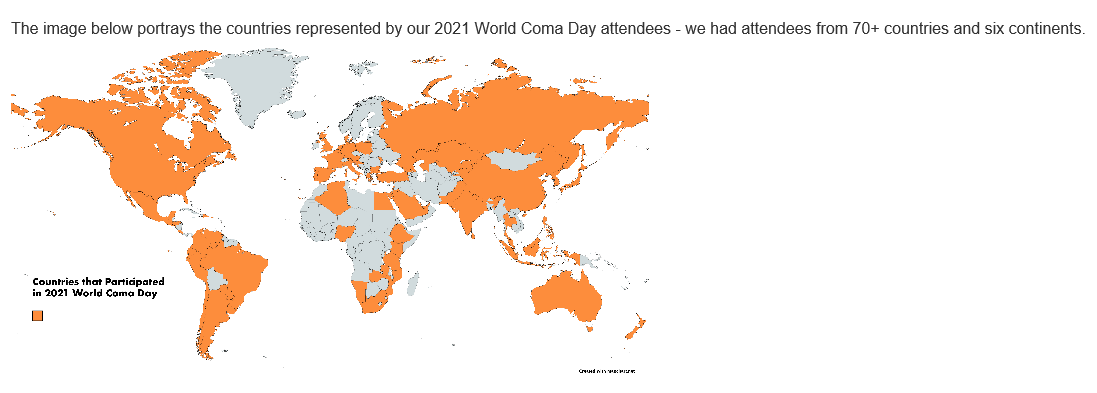World Coma Day 2021 Wrap-Up
Published on: April 28, 2021
Curing Coma Campaign Mission Control
The Curing Coma Campaign (CCC) is a global public health initiative with an overarching goal of developing and implementing diagnostic, therapeutic and prognostic strategies to improve the lives of patients with coma and disorders of consciousness. World Coma Day, an initiative of the CCC was organized as a virtual event targeting a global audience and is a part of an ongoing clinical and scientific endeavor to improve coma care. The first World Coma Day was held on March 22, 2021 (starting 0:00 GMT). It was a popular virtual event with over 1,200 registrants. The participants represented over 70 countries spanning 6 continents! (Figure 1). At any point during the 24-hour event there were always at least 50-100 attendees. In addition to the scientific discussions from world leaders in coma, dedicated educational content for patients, families, and the shout-out videos from centers celebrating WCD across the world, the results of the much-awaited COME-toGETHER global survey were announced during this event.
The intent of the COMa EpidemioloGy, Evaluation and THERapy (COME-toGETHER) survey was to investigate and understand the clinical spectrum of coma including the definition, diagnostic tools, treatment modalities, and prognostic factors. During the 4-month survey period starting September 2020, 258 health care professionals from 41 countries completed the survey and provided > 88% response rate in all domains. The results of this comprehensive global survey highlighted the worldwide variability in our current understanding and practice related to coma and has set the groundwork to identify key areas of future coma research in areas of therapeutic strategies, prognostic trajectories and pathobiological mechanisms. During this event, the authors of the World Brain Death project also shared their experience and discussed the global consensus statement.1 The recommendations from this consensus statement have been endorsed by multiple international societies and serve as a guide to professional societies and countries across the world to help revise and harmonize protocols pertaining to brain death determination by neurologic criteria.
 Patient and family perspective is crucial to foster the culture of shared-decision making and plan the future of coma care. Several sessions were dedicated to patient centered care and shared decision making to emphasize this aspect of coma care. Additionally, Stig Broeckx, the famous Belgian racing cyclist shared his awe-inspiring story of resilience, perseverance and determination and walked the audience through his continuing journey of recovery after 6 months of vegetative coma from being struck by a motorcycle during the 5th stage of the 2016 Tour of Belgium.
Patient and family perspective is crucial to foster the culture of shared-decision making and plan the future of coma care. Several sessions were dedicated to patient centered care and shared decision making to emphasize this aspect of coma care. Additionally, Stig Broeckx, the famous Belgian racing cyclist shared his awe-inspiring story of resilience, perseverance and determination and walked the audience through his continuing journey of recovery after 6 months of vegetative coma from being struck by a motorcycle during the 5th stage of the 2016 Tour of Belgium.
The World Coma Day participants also had the opportunity to learn about coma science including biology of coma, available treatment strategies to help stimulate awakening of patients from coma as well as the scoring and interpretation of coma recovery scales. In addition, the lively and engaging session on myths and facts related to coma recovery was very timely and helped address widespread misconceptions pertaining to disorders of consciousness. Moreover, the attendees also had the opportunity to view shout out videos from clinicians and scientists across the world as various groups joined in the World Coma Day celebration and highlighted their work.
The inaugural WORLD COMA DAY was a huge success! Featured scientific and special interest sessions ensured that this 24-hour event had a consistent presence of engaging panel discussions with Q&A in between sessions, which encouraged active participation from attendees around the clock. The existing worldwide variation in clinical practices related to disorders of consciousness and the acute need to advance coma science emerged as a resounding theme across multiple sessions and moderated discussions. This 24-hour event was adjourned with the announcement that the second annual World Coma Day will take place on March 22, 2022.
As the CCC team continues to forge ahead with this colossal mission, global participation and collaboration remain the key to the success of this program. The World Coma Day provides a global virtual platform for clinicians, scientists, patients and family to come together and join hands in this important mission to help improve lives of people across the globe.

Figure 1.
References
1Greer DM, Shemie SD, Lewis A, et al. Determination of Brain Death/Death by Neurologic Criteria: The World Brain Death Project. JAMA. 2020;324(11):1078–1097. doi:10.1001/jama.2020.11586
Acknowledgements
Special thanks to the World Coma Day Planning Committee: Jennifer Frontera, MD; Neha Dangayach, MD, MSCR; Brandon Foreman, MD; Olivia Gosseries, PhD; Raimund Helbok, MD; Stephan Mayer, MD; Chethan Rao, MD, FNCS; Shraddha Mainali, MD; Len Polizzotto, PhD; DaiWai Olson, PhD, RN; J. Claude Hemphill, MD, MAS, FNCS